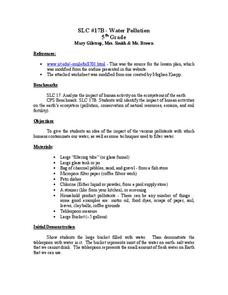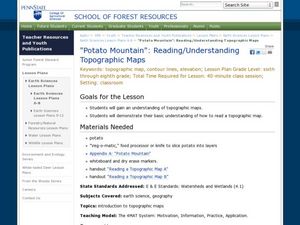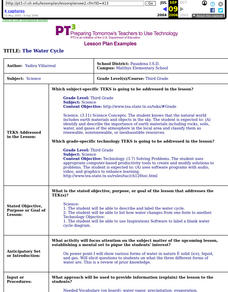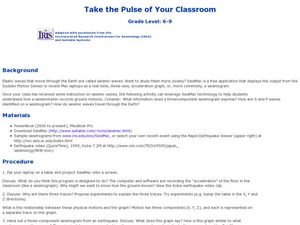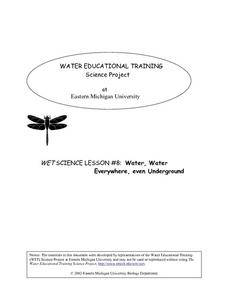Curated OER
The Carbon Cycle
Fifth graders examine the carbon cycle, periodic table, and photosynthesis and respiration. They analyze the periodic table and how it is organized, then complete the "Elementary, Dear Watson" worksheet. Students then examine a carbon...
Curated OER
Erosion
Fifth graders study what erosion is, what causes it, and ways to slow its progress. They complete an experiment that depicts soil moving down a slope as water is poured on it to show how moving water erodes land. Next, they observe...
Curated OER
Erosion
Students discover the meaning of the word erosion and discuss effects of rocks and sticks upon the soil. They then work in small groups to construct a model of erosion to make observations and then write them in their science journals.
Curated OER
Water Pollution
Fifth graders investigate how humans pollute the water supply with a number of different contaminates. While working in small groups they examine screening, sedimentation, filtration, and chemical treatments as methods of water treatment.
Curated OER
"Potato Mountain": Reading/Understanding Topographic Maps
Students investigate how to read topographic maps. In this map reading lesson plan students complete a topographic map activity.
Curated OER
Microbes and Climate
Learners examine how microbes play a role in the climate system. In this climate lesson students complete an activity, create a PowerPoint presentation and present it to the class.
Curated OER
Agents of Erosion
Fourth graders explore the agents of erosion. They observe rocks that are rough and unweathered and record observations. They investigate rocks rubbed with sandpaper and ones that are not and the effects that the sandpaper has on the...
Curated OER
Water Pollution
Fifth graders observe and record what happens when household products are added to a tank of water to depict water pollution. They brainstorm ideas of how to clean the contaminate out of the water before watching demonstrations of...
Curated OER
The Nitrogen Cycle
Fifth graders investigate the nitrogen cycle and examine the concepts of decomposition and nitrification. Students participate in a class discussion about the creation of waste and ammonia compounds, then using nitrogen cycle cut-outs...
Curated OER
Reduce, Reuse, Recycle
Young scholars develop a recycling plan. In this environmental lesson, students develop a recycling plan for their school. Young scholars write an outline of the plan to present to their class.
Curated OER
Exploring Our Watershed System
Students study watersheds and examine how they are composed. In this watershed system lesson students explain how water enters a watershed and the concept of stream order.
Curated OER
A Model of the Rock Cycle
For this rock cycle worksheet, students use different colored crayons to represent different types of rocks. They follow step by step procedures to model the rock cycle with the crayons. Students draw the rock cycle, show weathering,...
Curated OER
Gettysburg Rocks Recycle to Win
Eighth graders use a geologic cross section to study the rock cycle of the Gettysburg battlefield. In this rock cycle lesson, 8th graders connect the rock cycle and continental rifting.
Curated OER
Aquifer Model
Students, after researching and brainstorming about aquifers and locating aquifer maps of Texas, participate in the building of a model of an aquifer complete with a pumping station. They also answer a variety of questions at the...
Curated OER
The Water Cycle--Using Inspiration Software
Third graders describe and label the water cycle, and list how water changes from one form to another; students use Inspiration Software to label a blank water cycle diagram.
Curated OER
Volcanic Activity in the U.S.
Students locate and map ten volcanoes in United States, create chart comparing volcanoes by last eruption, type of volcano, location, and interesting fact, and create Powerpoint slide show describing basic
information about volcanoes and...
Curated OER
Parts of an Ecosystem
Fourth graders study the Great Salt lake and the ecosystem that encompasses it. They study the relationship between an individual of a species, a population of that species, a community that includes that population, and the...
Curated OER
Take the Pulse of Your Classroom
Students discuss seismic waves. In this science lesson, students investigate the acceleration of the floor in the classroom similar to a seismograph. Students observe a three-component seismogram from an earthquake and determine what it...
Curated OER
Water, Water Everywhere, Even Underground
The "Engage" section of a wetlands lesson plan asks young ecologists to examine a wetlands poster. You can easily find one online and display it using a projector. Pupils immerse a piece of sandstone and a piece of granite in water to...
Science 4 Inquiry
Edible Plate Tectonics
Many people think they can't observe plate tectonics, but thanks to GPS, we know that Australia moves at a rate of 2.7 inches per year, North America at 1 inches per year, and the Pacific plate at more than 3 inches per year! Scholars...
Ocean Explorer
Living with the Heat
Young oceanographers study the Submarine Ring of Fire, which is a series of deep-water volcanic vents that come up from the ocean floor. Learners take a close look at the unique ecosystems that are associated with these areas, how these...
Curated OER
What's Down There?
Investigate the coral reefs around Mokolai Island, Hawaii by researching and writing about improving the reef ecosystem. Students map threats to the ecosystem and use the list of key words to assist in their descriptions
Curated OER
Moh's Hardness Test
Young geologists utilize Moh's hardness scale to help them correctly sort and classify different types of rocks. This instructional activity has everything you need, including an excellent example of the Mohs' Hardness Test, to...
Curated OER
Motion in the Ocean
How does the formation of currents and waves in the ocean happen? High schoolers will learn about the primary causes for ocean currents and waves by calculating a wave's amplitude and nautical mile speed. Then they will complete a...





